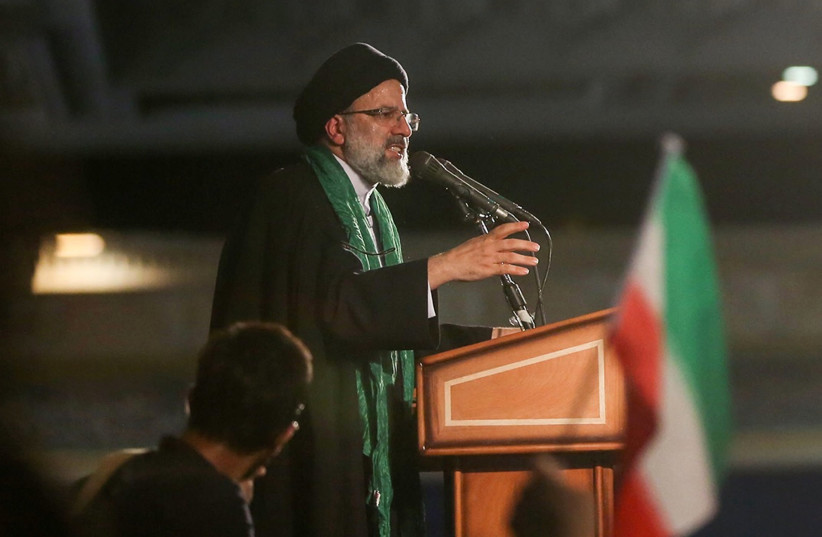Lapid: His election should prompt renewed determination to immediately halt Iran’s nuclear program.

(photo credit: REUTERS)
Ebrahim Raisi, a hardline judge under US sanctions for human rights abuses, secured victory as expected on Saturday in Iran’s presidential election after a contest marked by voter apathy over economic hardships and political restrictions.
With all 28.9 million ballots counted, Raisi was elected with a tally of 17.9 million, Interior Minister Abdolreza Rahmani Fazli said on state TV.
Turnout in Friday’s four-man race was a record low of around 48.8% and there were 3.7 million invalid ballots that were likely to have been mostly blank or protest votes.
Foreign Minister Yair Lapid called Raisi the “Butcher of Tehran” and “an extremist responsible for the deaths of thousands of Iranians.”
“His election should prompt renewed determination to immediately halt Iran’s nuclear program and put an end to its destructive regional ambitions,” Lapid tweeted.
The Foreign Ministry said Raisi has “been rightly denounced by the international community for his direct role in the extrajudicial executions of over 30,000 people.
“An extremist figure, committed to Iran’s rapidly advancing military nuclear program, his election makes clear Iran’s true malign intentions, and should prompt grave concern among the international community,” the ministry stated.
Raisi’s election comes as Iran and six major powers are in talks to revive their 2015 nuclear deal. Donald Trump, US president at the time, abandoned the deal in 2018 and reimposed crippling sanctions that have squeezed Iran’s oil income.
However, with Iran’s ruling clerics aware their political fortunes rely on tackling worsening economic hardships, Raisi’s win is considered unlikely to disrupt Iran’s effort to revive the pact and break free of tough US oil and financial sanctions.
Supreme Leader Ayatollah Ali Khamenei, not the president, has the last say on all issue of state such as Iran’s foreign and nuclear policies.
Discussing the negotiations to return to the JCPOA nuclear deal following Saturday’s election result, Iranian Foreign Minister Javad Zarif said that an agreement could be reached before Iranian President Hassan Rouhani leaves office between August 3 and mid-August.
In an interview published in Iranian media on the sidelines of the Antalya Diplomacy Forum, Zarif said that “There is a good chance that an agreement will be reached before the end of our tenure. We will hand over the power to the new administration in mid-August and I think we will probably be able to reach an agreement long before that date.
“I have seen the latest edited draft of the agreement. The draft has become purer. The parentheses [the issues of the dispute] are being removed,” he added.
APPOINTED BY Khamenei to the high-profile job of judiciary chief in 2019, Raisi was placed under US sanctions a few months later over human rights violations.
Those included the role that human rights group say Raisi played in the executions of thousands of political prisoners in 1988 and in the violent suppression of unrest in 2009.
Iran has never acknowledged the mass executions, and Raisi himself has never publicly addressed allegations about his role.
Seen by analysts and insiders as representing the security establishment at its most fearsome, Raisi, 60, had been widely tipped to win the contest, thanks to Khamenei’s endorsement.
Iran’s regional allies, Syrian President Bashar Assad and the terrorist Islamist group Hamas, welcomed Raisi’s election. Amnesty International’s Secretary General Agnès Callamard said his victory was “a grim reminder that impunity reigns supreme in Iran.”
“We continue to call for Ebrahim Raisi to be investigated for his involvement in past and ongoing crimes under international law, including by states that exercise universal jurisdiction,” she said in a statement.
Outgoing President Hassan Rouhani, barred by the constitution from seeking a third term, visited Raisi at his office to congratulate him, and Foreign Minister Mohammad Javad Zarif said he would lead Iran well.
“Backed by your high vote and exceptional confidence, I will form a hard-working, revolutionary and anti-corruption government,” state media quoted Raisi as saying in a statement.
Raisi, who takes office in early August, said he will be a president for all Iranians – whether they voted for him or for the other candidates, or did not vote at all.
Hoping to boost their legitimacy, the country’s clerical rulers had urged people to turn out and vote on Friday, but simmering anger over economic hardships and curbs on freedoms kept many Iranians at home.
Khamenei said the turnout displayed the clerical establishment’s popularity. But more than half of eligible voters were too dissatisfied to vote or appeared to have heeded calls by hundreds of dissidents, at home and abroad, to boycott the vote.
Another deterrent for many pro-reform voters was a lack of choice, after a hardline election body barred heavyweight moderates and conservatives from standing.
The only real reformist-pragmatist camp candidate, Abdolnaser Hemamti, gained 3,412,712 compared to Rouhani’s 23 million in 2017, with most voters in that camp staying home.
A US State Department spokesperson said on Friday: “Iranians were denied their right to choose their own leaders in a free and fair electoral process” – a likely reference to the disqualification of candidates.
Analysts say the election win could increase Raisi’s chances of succeeding Khamenei, who himself served two terms as president before becoming supreme leader in 1989.
As reported by The Jerusalem Post
